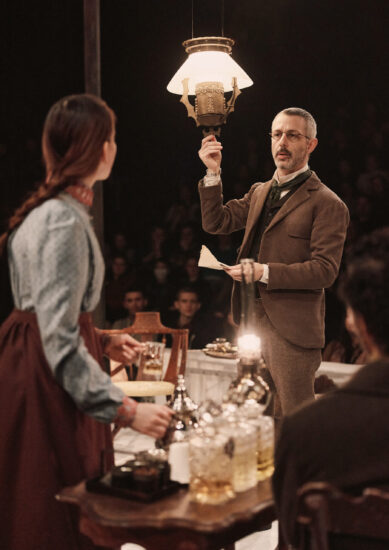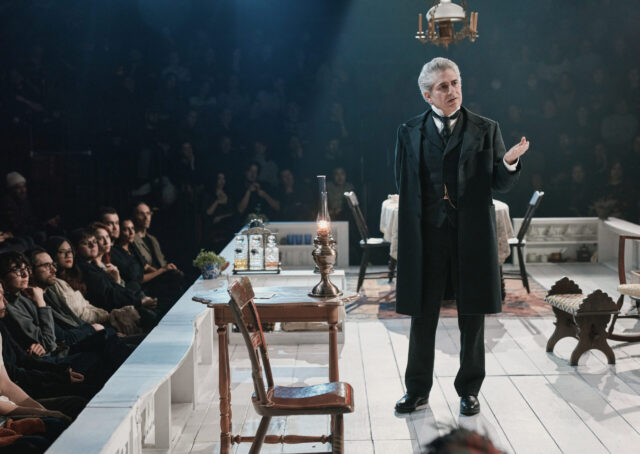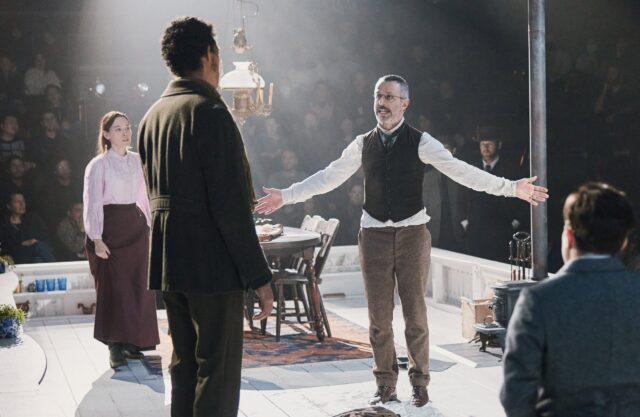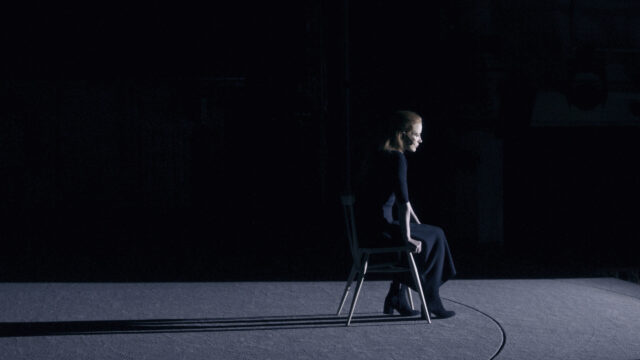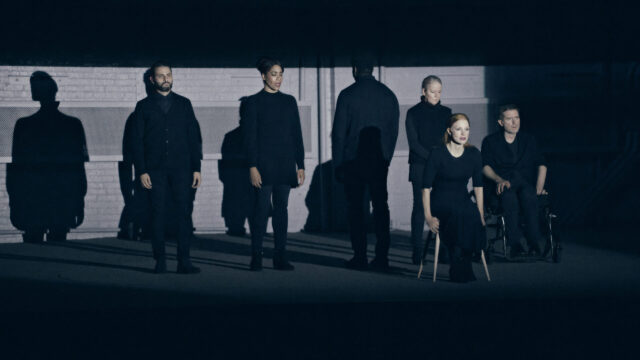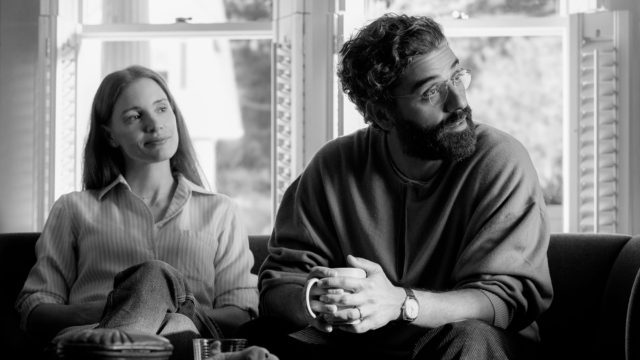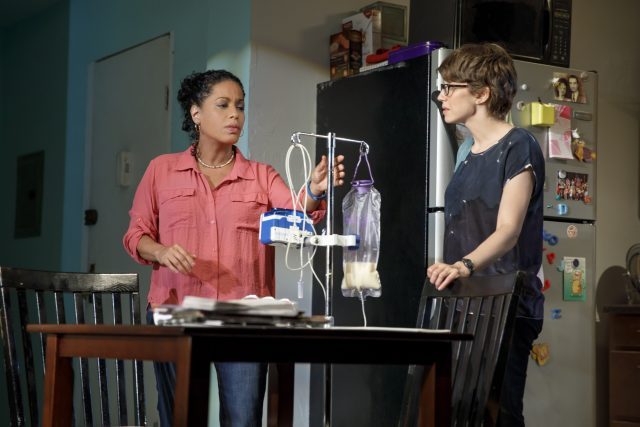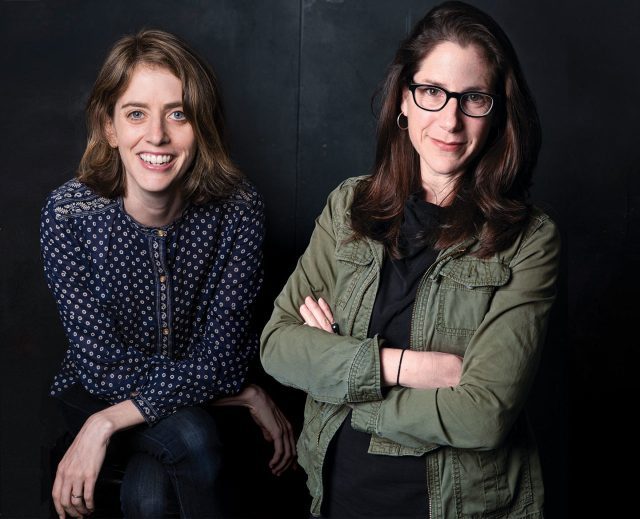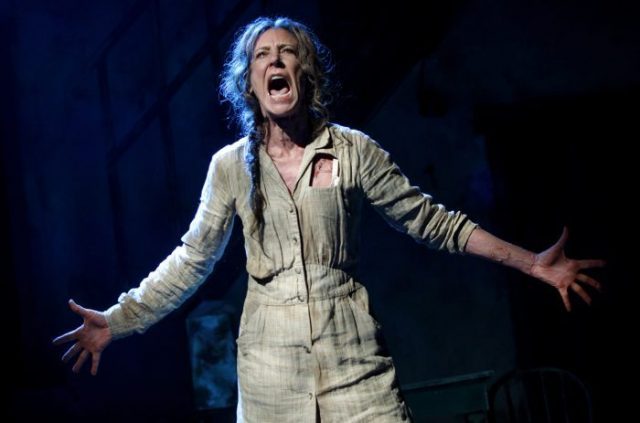
Jessica Lange is mesmerizing as a troubled matriarch in Mother Play (photo by Joan Marcus 2024)
MOTHER PLAY
Helen Hayes Theater
240 West 44th St.
Tuesday – Sunday through June 16, $108-$270
2st.com/shows
Mothers and motherhood have always taken center stage on Broadway, from Rose in Gypsy, Fantine in Les Misérables, and Heidi in Dear Evan Hansen to Mary Tyrone in Long Day’s Journey into Night, Amanda Wingfield in The Glass Menagerie, and Canteen Anna in Mother Courage and Her Children. This Mother’s Day is an ideal time to pay tribute to two extraordinary semiautobiographical plays now on Broadway, each focused on a unique mom.
At the Helen Hayes through June 16, Tony, Oscar, and Emmy winner Jessica Lange is starring as Phyllis Herman in Paula Vogel’s Mother Play — A Play in Five Evictions. As the audience enters the theater, a soundtrack is playing mother-related pop songs, from the Beatles’ “Your Mother Should Know” to the Mothers of Invention’s “Mother People,” getting everyone in the mood.
The story takes place from 1962 to the present as Phyllis and her two children, Carl (Jim Parsons) and Martha (Celia Keenan-Bolger), keep moving apartments, going up a floor each time, trying to improve their lot in life. Phyllis is a supreme diva, laying out on a fancy chair and having her kids light her cigarettes and serve her martinis. Her husband left years before and is out of the picture; Phyllis works in a typing pool but imagines herself enrobed in haute couture like Audrey Hepburn.
The memory play is narrated by Martha, who tells the audience at the beginning, “By age eleven, I had already moved seven times. My father had a habit of not paying rent. My mother, brother, and I could pack up our house in a day. A very useful skill. To know what household goods are in every box so one can also unpack in a day. Family in, family out. When I packed up my brother Carl’s apartment after he died, everything he loved fit into one medium size U-Haul box. There is a season for packing. And a season for unpacking.”
There’s a lot of packing and unpacking in the play, literally and figuratively. Whenever the family moves, they rearrange David Zinn’s set, using the same furniture, although different lighting fixtures come down from above. Phyllis insists on listening to old songs on the radio — her favorite is “Moon River,” which Hepburn sang in Breakfast at Tiffany’s — while her children attempt to listen to more modern music but are unable to get their mother out of the past.
Early on, Carl asks, “It’s over, isn’t it?” Martha replies, “What?” Carl answers, “Childhood.”
Carl and Martha have to grow up fast, catering to their mother’s needs, as opposed to her taking care of theirs. She does have a magic purse from which she can suddenly pull out a bag of McDonald’s, but she lacks almost any kind of mothering instinct. It gets worse when Carl tells her he is gay, as she angrily banishes him from their home. And she has little hope for Martha, who she calls “unremarkable,” believing the best she can do is “find an unremarkable man who doesn’t have enough imagination to cheat and drink and whore himself around town like her father does. After a year of learning how to cook, Martha will get a bun in the oven, and give me a grandchild. Because, honey, you are never a true woman until you have children.”
Phyllis might not win any Mother of the Year contests, as she admits herself, but she is not a monster. She works hard to keep a roof over their head, even if there are occasional roach problems, but she doesn’t help matters when she says she never wanted to have children, coldly explaining to Martha, “It’s a life sentence.”
The closing scenes are emotionally gut-wrenching, avoiding genre clichés as some threads are resolved and others remain packed away in boxes, perhaps never to be opened again.

Phyllis (Jessica Lange) seeks solace from her son (Jim Parsons) and daughter (Celia Keenan-Bolger) in new Paula Vogel play (photo by Joan Marcus 2024)
Pulitzer Prize winner and three-time Tony nominee Vogel (How I Learned to Drive, Indecent) based Mother Play in part on her life. Vogel, who has been married to author and professor Anne Fausto-Sterling since 2004 and does not have any children, had a brother named Carl who died of AIDS; her other brother is Mark. Their parents divorced when she was eleven, the same age as Martha in 1962, and Vogel’s mother was a secretary for the United States Postal Service, a job that Phyllis gets in the play.
But Vogel is such a potent writer that Mother Play feels intimate and personal but never overly confessional or didactic. Except for one out-of-place scene, the narrative flows with a natural sensibility that is transfixing, directed by Landau (SpongeBob SquarePants Big Love) with a powerful fluency.
Keenan-Bolger (A Parallelogram, The Glass Menagerie) and Parsons (A Man of No Importance The Boys in the Band) are exceptional as the siblings, who are caught up in a seemingly unwinnable existence but refuse to give up. As psychologically tortured as they are by their mother, they still know when to do the right thing for the family. Keenan-Bolger, Parsons, Vogel, and Lange all received well-deserved Tony nominations.
Lange is magnificent as Phyllis; she gives a grand dame performance that you can’t take your eyes off of. At seventy-five, Lange, who has three children, continues to hone her craft with grace and elegance while not being afraid to reach deep inside her. She has previously portrayed Mary Tyrone (Long Day’s Journey into Night) and Amanda Wingfield on Broadway, and Mother Play completes a kind of unofficial trilogy in style.

Rachel McAdams is sensational as the mother of a seriously ill child in Mary Jane (photo by Matthew Murphy)
MARY JANE
Samuel J. Friedman Theatre
261 West Forty-Seventh St. between Broadway & Eighth Ave.
Tuesday – Sunday through June 16, $80-$328
www.manhattantheatreclub.com
The concept of Mother’s Day goes back to before the Civil War, but it began to take shape in 1868 when Ann Reeves Jarvis started Mothers’ Friendship Day as a way to bring together Union and Confederate families, and then in 1870 when abolitionist and suffragist Julia Ward Howe, author of “The Battle Hymn of the Republic,” presented the Mother’s Day Proclamation for Peace. In 1904, Fraternal Order of Eagles Past Grand Worthy President Frank E. Hering called for a day to honor mothers everywhere; he later became known as the Father of Mother’s Day. President Woodrow Wilson, who had fought against women’s right to vote, proclaimed Mother’s Day a national holiday in May 1914.
On this Mother’s Day, Phyllis Herman may understand that she is not going to be named Mother of the Year, but Mary Jane has a much better shot at it.
In Amy Herzog’s exquisitely rendered Mary Jane, continuing at MTC’s Samuel J. Friedman Theatre through June 16, Rachel McAdams makes a sensational stage debut as the title character, a single mother raising a seriously ill child who requires round-the-clock care. Mary Jane is a kind of saint; she navigates through her complicated circumstances with a smile even as she sacrifices her career and personal life to devote nearly every minute to Alex, who is essentially being kept alive by machines.
Mary Jane does not complain about her husband’s leaving shortly after Alex’s premature birth. She refuses to report one of Alex’s nurses for falling asleep on the job and endangering him. She gives important advice to a woman (Susan Pourfar) who has just had a child like Alex. And she finds the time to listen to other people’s problems and concerns, not concentrating solely on her situation.
Mary Jane lives in a one-bedroom apartment in Queens, where she sleeps on a foldout bed in the living room/kitchen. She is friendly with her most dependable nurse, Sherry (April Matthis), as well as with her dedicated super, the tough-talking, straight-shooting Ruthie (Brenda Wehle). She encourages Sherry’s shy, neurodivergent niece, Amelia (Lily Santiago), who would like to meet Alex.
While fixing a clog in the kitchen sink, Ruthie tells Mary Jane, “You seem to be someone who’s carrying a lot of tension in her body. . . . You’re very nice, very pleasant, you’re very pleasant and with what you’re dealing with I wonder if you have an outlet for expression or if you’re absorbing that all in your body. It’s just a thought. It might not be a useful thought. . . . Because that’s how my sister got cancer.” It’s an astute observation that is all too true.
Mary Jane’s job, and health insurance, is in jeopardy when Alex is hospitalized for months after a seizure. At the hospital, Mary Jane speaks with Chaya (Pourfar), a Hasidic woman with seven kids, including one in the same situation as Alex. Chaya has a more practical point of view with more hope for the future; it’s no coincidence that her name means “life” in Hebrew and that her sick daughter’s name, Adina, means “delicate” or “gentle.” In the Bible, Adina is the mother of two of the matriarchs, Rachel and Leah.
At the hospital, Mary Jane speaks with Dr. Toros (Matthis), who strongly advises she get some rest. “I’ve seen a lot of parents come through here. It’s important to take care of yourself. Sleep in your own bed, take a bubble bath,” the doctor says, but Mary Jane insists she’s okay. Dr. Toros calls Mary Jane “mom,” perhaps because she knows Mary Jane will never hear that word from Alex. But the cracks start showing up when Kat (Santiago), the music therapist, has not shown up yet to sing to Alex.

Mary Jane (Rachel McAdams) and Chaya (Susan Pourfar) share their stories while on the pediatric floor of a Manhattan hospital (photo by Matthew Murphy)
Pulitzer finalist and three-time Tony nominee Herzog (A Doll’s House, 4000 Miles) based Mary Jane in part on her life. Herzog and her husband, Tony-winning director Sam Gold — the partners collaborated for the first time on the current Tony-nominated adaptation of Henrik Ibsen’s An Enemy of the People at Circle in the Square — had two daughters, but their eldest, Frances, died from nemaline myopathy in 2023 at the age of eleven.
In Mother Play, the set remains the same but the furniture is moved around for each scene. In Mary Jane, Lael Jellinek’s set undergoes a major change when the action shifts to the pediatric ICU of a Manhattan hospital; what happens to Mary Jane’s living room/kitchen is pure genius, adding an extra level of insight to the story.
Herzog and director Anne Kaufman (The Sign in Sidney Brustein’s Window, The Nether) premiered the play at Yale Repertory Theatre in April 2017, then brought it to 2017 at New York Theatre Workshop that September, with Carrie Coon as Mary Jane, Liza Colón-Zayas as Sherry and Dr. Toros, and Danaya Esperanza as Amelia and Kat. Pourfar (Mary Page Marlowe, Tribes) and Wehle (The Big Knife) do a fine job reprising their roles on Broadway, with Obie winner Matthis (Primary Trust, Toni Stone) excelling as Sherry and Dr. Toros, and Santiago (King Lear, Mac Beth) making a fine Broadway debut as the curious Amelia.
Making her New York City theatrical debut at forty-five, Oscar nominee McAdams (The Notebook, Mean Girls) is magnificent as Mary Jane, commanding the stage and the audience’s attention as if she were a seasoned theater pro. McAdams, who has two children, imbues her character with a positive attitude that belies, deep down, her carefully controlled anxiety. Mary Jane wants to do all the right things as a mother, but, as with Phyllis, finances get in the way, and the definition of “a life sentence” is very different. However, there is a key moment when Mary Jane wonders if what she’s doing is right for Alex himself, something that never occurs to Phyllis.
The play, which earned four Tony nods, for McAdams, Herzog, Kaufman, and sound designer Leah Gelpe, concludes with a fascinating scene that seems to unfold in its own time and space, in which Mary Jane finally opens up. It’s funny, strange, and heart-wrenching, a moving coda to a powerful, emotional experience.
[Mark Rifkin is a Brooklyn-born, Manhattan-based writer and editor; you can follow him on Substack here.]
